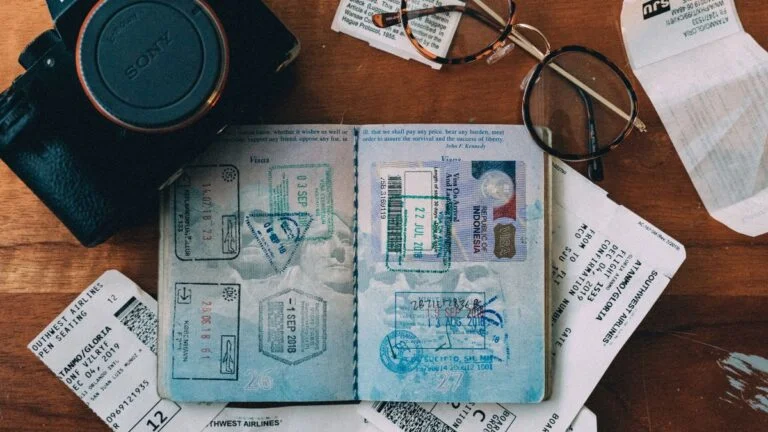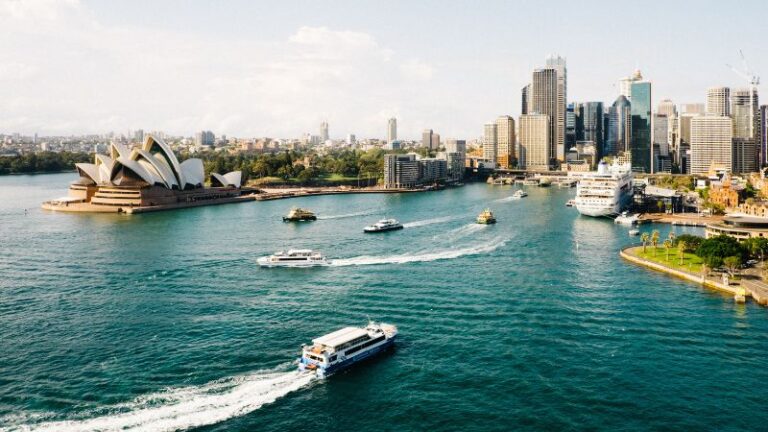How Much Is a Trip To Vietnam? Is It Expensive?

As participants in Amazon Associates and other programs, we earn from qualifying purchases. This comes at no additional cost to you. For more details, see our Affiliate Disclosure.
Vietnam is a beautiful country with a rich culture, stunning landscapes, and delicious cuisine. It’s a popular destination for travelers from all over the world, and many people wonder about the cost of a trip to Vietnam. Is it expensive?
The answer to this question depends on various factors such as the length of your stay, your travel style, and the activities you plan to do. In this article, we’ll explore the costs associated with traveling to Vietnam and help you plan your budget for an unforgettable trip.
Please note that all the prices in this article are approximate and can vary based on factors like seasonality, the specific provider, and how far in advance you book.
Understanding Vietnam’s Currency: The Vietnamese Dong
The currency in Vietnam is the Vietnamese Dong (VND). As a traveler, understanding the basics of this currency is crucial to managing your budget effectively during your trip.
The first thing you’ll notice is that the Dong has a lot of zeros. As of writing this article, on July 2023, $1 USD is equivalent to about 23,000 VND. Don’t worry though, you’ll quickly get used to dealing with thousands and millions in your day-to-day transactions.
It’s also important to note that while credit cards are accepted in many places, especially in major cities like Hanoi or Ho Chi Minh City, Vietnam is still largely a cash-based society. So, always carry some Dong with you, especially when venturing out to smaller towns, markets, or street food stalls.
When exchanging currency, it’s usually best to do so at a bank or a regulated forex bureau, rather than at the airport where rates are typically less favorable. Keep in mind, ATMs are readily available throughout the country and they dispense VND, though they often have withdrawal limits and can incur fees.
Lastly, don’t be surprised if you receive slightly torn or old banknotes. It’s common in Vietnam and they are still accepted everywhere. However, try to keep your own notes in good condition, as some places may be reluctant to accept damaged foreign currency.
Understanding the Vietnamese Dong will help you handle your finances effectively during your Vietnam adventure. It’s a part of the journey that might seem daunting at first, but it adds to the unique charm of travelling in this beautiful country.
Budgeting for Accommodation in Vietnam
Vietnam offers a wide range of accommodations to suit every budget, from backpacker hostels to luxury resorts. Regardless of where you choose to stay, the cost of accommodation in Vietnam is generally quite affordable when compared to other travel destinations.
Budget travelers can find dormitory rooms in hostels starting from as low as $5 per night. These hostels typically come with shared bathroom facilities and common areas where you can meet fellow travelers. They’re often located in the city center or close to popular tourist attractions.
Mid-range accommodation options such as guesthouses or budget hotels range from $20-$30 per night. These usually provide private rooms with en-suite bathrooms, air conditioning, and sometimes breakfast. These establishments provide a comfortable stay without breaking the bank and are widely available throughout the country.
Luxury accommodations in Vietnam can start from around $60 per night and can go up significantly from there, depending on the level of opulence you’re looking for. Luxury resorts and high-end hotels usually offer spacious, well-appointed rooms, top-notch amenities, multiple dining options, and often stunning views.
Keep in mind, prices can vary based on the location, time of the year, and how far in advance you book. It’s also not uncommon in Vietnam to negotiate the price, especially in the off-peak season.
Here’s a simple table to illustrate the average cost of accommodations in Vietnam:
| Accommodation Type | Average Cost per Night (USD) |
|---|---|
| Hostel (Dormitory) | $5 – $10 |
| Budget Hotel/Guesthouse | $20 – $30 |
| Luxury Hotel/Resort | $60 and up |
The Cost of Transportation: Getting Around Vietnam
Vietnam’s transportation network is extensive and relatively inexpensive, making it easy for travelers to get around. Whether you’re traveling within a city or across the country, there are numerous options to suit every budget.
Local Transportation: For short-distance travel within cities, taxis and motorbike taxis (locally known as ‘xe om’) are widely available. Taxis are metered, and rates typically start from 10,000 to 15,000 VND (approximately $0.43 to $0.65) per kilometer. For a cheaper and more local experience, motorbike taxis can take you short distances for as little as 10,000 VND. For self-guided exploration, motorbike rental is popular, costing around 100,000 to 200,000 VND (approximately $4.30 to $8.60) per day.
Bus: Buses are the most cost-effective way to travel between cities. For instance, a bus ticket from Ho Chi Minh City to Da Nang can range from 200,000 to 400,000 VND (approximately $8.60 to $17.20). Within cities, public buses charge a flat rate of 5,000 to 7,000 VND (approximately $0.21 to $0.30) per journey.
Train: Train travel offers a scenic and comfortable option to get from north to south or vice versa. A soft sleeper berth in a train from Hanoi to Ho Chi Minh City, for example, costs around 1,000,000 to 1,500,000 VND (approximately $43 to $65).
Air Travel: For longer distances or to save time, domestic flights are a good option. The major airlines are Vietnam Airlines, VietJet Air, and Bamboo Airways. A one-way flight from Hanoi to Ho Chi Minh City can range from 1,000,000 to 2,000,000 VND (approximately $43 to $86), but promotional fares can be significantly cheaper if booked in advance.
Here’s a representation of the various transportation costs in Vietnam:
| Type of Transportation | Cost Range in VND | Approximate Cost in USD |
|---|---|---|
| Local Taxi (per km) | 10,000 – 15,000 | $0.43 – $0.65 |
| Motorbike Taxi (Short distances) | Around 10,000 | $0.43 |
| Motorbike Rental (per day) | 100,000 – 200,000 | $4.30 – $8.60 |
| Bus (Inter-city travel) | 200,000 – 400,000 | $8.60 – $17.20 |
| City Bus (per journey) | 5,000 – 7,000 | $0.21 – $0.30 |
| Train (e.g., Hanoi to Ho Chi Minh City) | 1,000,000 – 1,500,000 | $43 – $65 |
| Domestic Flight (e.g., Hanoi to Ho Chi Minh City) | 1,000,000 – 2,000,000 | $43 – $86 |
Delicious and Affordable: The Cost of Food and Drinks in Vietnam
Feasting in Vietnam is not only an explosion of flavors, but also remarkably easy on the wallet. Whether you’re tasting a bowl of Phở at a street side stall, enjoying a meal at a local restaurant, or sipping on craft beer or cocktails, you’ll find that the price tags are incredibly reasonable. Vietnamese food is known for its complex flavors, fresh ingredients, and variety, with each region offering its own distinct culinary experiences.
Here’s a quick overview of what you can expect to pay for food and drinks in Vietnam:
| Food/Drink Type | Average Cost in VND | Average Cost in USD |
|---|---|---|
| Street Food Meal | 20,000 – 50,000 | $0.86 – $2.15 |
| Local Restaurant Meal | 70,000 – 200,000 | $3 – $8.60 |
| Fine Dining at Upscale Restaurant | 500,000 – 1,500,000 | $21.50 – $64.50 |
| Domestic Beer (like Bia Saigon) | 10,000 – 30,000 | $0.43 – $1.29 |
| Craft Beer (like at Pasteur Street Brewing) | 70,000 | $3 |
| Cocktails (like at Mango Rooms in Hoi An) | 100,000 | $4 |
Exploring Vietnam: Activity and Sightseeing Costs

Exploring Vietnam offers a variety of experiences that cater to different types of travelers. Whether you’re an adventurous trekker interested in hikes through Sapa’s mountainous terrain, a history enthusiast keen on visiting museums and war remnants, or a culture lover desiring to watch traditional Vietnamese water puppet shows, the costs associated with these activities are generally modest and provide good value for money.
Here are some typical costs you can expect for popular activities and sights in Vietnam:
| Activity/Sightseeing | Average Cost in VND | Average Cost in USD |
|---|---|---|
| Museum Entry Fees | 10,000 – 40,000 | $0.43 – $1.72 |
| Historical Sites (e.g., Imperial Citadel of Thang Long, Cu Chi Tunnels) | 40,000 – 250,000 | $1.72 – $10.77 |
| Traditional Shows (e.g., Water Puppet Theatre) | 100,000 – 200,000 | $4.30 – $8.60 |
| Guided Tours (e.g., Ha Long Bay day tour) | 800,000 – 1,500,000 | $34.50 – $64.50 |
| National Park Entry (e.g., Phong Nha-Ke Bang) | 40,000 – 250,000 | $1.72 – $10.77 |
| Adventure Activities (e.g., Trekking in Sapa) | 500,000 – 2,500,000 | $21.50 – $10 |
Staying Connected: The Cost of a SIM Card in Vietnam
Staying connected while traveling in Vietnam has been simplified with the advent of e-SIM cards. Whether you’re navigating your way around the cities, staying in touch with loved ones back home, or documenting your journey on social media, having reliable data access is crucial.
In Vietnam, you can opt for a physical SIM card or an e-SIM, with the latter growing in popularity due to its convenience. For e-SIMs, Airalo is a popular provider, offering 1GB of data for Vietnam at $4.50. The beauty of an e-SIM is that it can be purchased online prior to arrival and activated immediately once you land. However, ensure that your phone is e-SIM compatible before purchasing.
If you prefer a traditional SIM card, they can be bought at the airport or at local stores in the city, with a range of data packages available. While the cost may vary depending on the package you choose, you can expect to pay between 100,000 to 200,000 VND (approximately $4.30 to $8.60) for a SIM card with a substantial data package.
| Type of SIM Card | Average Cost in VND | Average Cost in USD |
|---|---|---|
| e-SIM (1GB) | N/A (Purchased in USD) | $4.50 |
| Traditional SIM Card (Large Data Package) | 100,000 – 200,000 | $4.30 – $8.60 |
Protecting Your Trip: The Importance of Travel Insurance
Travel insurance is an essential part of planning your trip to Vietnam, or any destination for that matter. It provides coverage for unexpected circumstances that could arise during your journey, from cancelled flights and lost luggage, to more serious situations like medical emergencies or the need to return home due to a family emergency.
In the face of unpredictable events, having travel insurance can provide financial security and peace of mind. For instance, if you’re involved in a motorbike accident, fall seriously ill, or need to cancel your trip due to unforeseen circumstances, the right travel insurance policy will cover these costs.
There are numerous providers out there, but one that comes highly recommended is SafetyWing. Not only do they offer coverage for COVID-19, but they also provide worldwide coverage, do not require a return ticket, and even allow you to buy coverage after you’ve left home. You can choose to pay monthly instead of upfront, and cancel at any time. With a clear and easy-to-understand pricing structure, SafetyWing charges $1.50 per day for travel insurance, making it a cost-effective choice for many travelers.
Remember, while no one plans for mishaps, they can happen. Therefore, investing in travel insurance is investing in your safety and well-being while exploring the world.
Adding it All Up: Total Daily Cost of Traveling in Vietnam
After taking into account the various aspects of your travel – accommodation, transport, activities, food and drink, and miscellaneous expenses like a local SIM card and travel insurance – you’ll have a clear picture of the total daily cost of traveling in Vietnam.
Here’s how it breaks down on average:
| Expense Category | Average Daily Cost per Person in USD |
|---|---|
| Accommodation | $21.00 |
| Transport | $4.30 |
| Activities | $7.50 |
| Food and Drink | $6.70 |
| Miscellaneous (SIM card, travel insurance) | $1.50 |
| Total | $41.00 |
Keep in mind that these are average estimates and your actual spending may vary depending on your travel style, where you choose to go, and what activities you partake in. However, as these figures show, traveling in Vietnam can be quite affordable and offer excellent value for money.
Tips for Traveling on a Budget in Vietnam
Traveling to Vietnam can be quite affordable, but with a few clever strategies, you can make your travel budget stretch even further. These tips for traveling on a budget in Vietnam can help you save money while still experiencing all the wonderful things the country has to offer.
- Eat at local food stalls: Instead of dining in touristy restaurants, take a culinary adventure at local food stalls. Vietnamese street food is not only incredibly delicious, but it’s also a bargain. A bowl of Pho or Bun Cha can cost as little as $1-$2. This can significantly cut down your daily food expenses, and also give you a more authentic dining experience.
- Use public transportation: While taxis and private cars might be more comfortable, they can also be pricier. Buses and trains are cheaper options for long-distance travel within Vietnam. In cities, consider using a motorbike taxi or renting a motorbike for a day. Not only are these options more affordable, but they can also give you a more local travel experience.
- Stay in guesthouses or hostels: Accommodations in Vietnam can cater to all budgets. If you’re looking to save, opt for guesthouses and hostels. These places are cheap and often include free Wi-Fi and breakfast. Plus, they’re a great way to meet other travelers.
- Travel off-season: If you’re flexible with your travel dates, consider visiting Vietnam during the off-peak seasons. You’ll likely find cheaper flight tickets, accommodations, and even some discounts on attractions. Do keep in mind though, off-season often coincides with the country’s rainy season, so pack accordingly.
- Negotiate prices: In local markets and with taxi drivers, prices are often negotiable. Don’t be shy about bargaining – it’s expected, and it can save you a significant amount of money. Just remember to always keep it friendly and respectful.
By following these tips, you can get the most value out of your Vietnam trip and maybe even save enough for your next adventure!
Is Vietnam Worth the Cost? An Overall Look at Value for Money
Traveling can sometimes seem like a luxury, and weighing up the costs against the experience is often a part of the planning process. In the case of Vietnam, the diversity of experiences, cultural richness, affordability, and warm hospitality make it an exceptional value-for-money destination.
Whether you’re a foodie eager to delve into the vibrant street food scene, an adventurer looking forward to navigating the country’s stunning landscapes, or a culture enthusiast keen to discover the nation’s history and tradition, Vietnam offers something for every traveler. The fact that you can enjoy all these for a cost that’s often significantly lower than many other destinations around the world only adds to the appeal.
In terms of accommodations, a range of options from budget hostels to luxurious resorts allow for flexibility, suiting different preferences and budgets. Similarly, the extensive transportation network provides affordable options to get around.
The richness and depth of experiences, combined with the country’s affordability, make Vietnam an excellent value destination. If you’re willing to step out of your comfort zone and embrace local customs and practices, your money can go a long way in providing a memorable and rewarding travel experience. So, in terms of whether Vietnam is worth the cost, the answer is a resounding yes.






